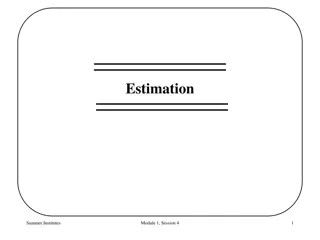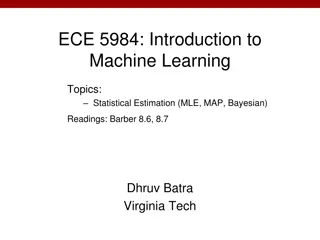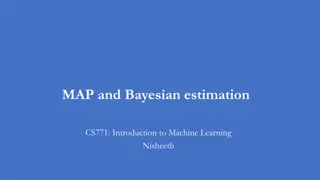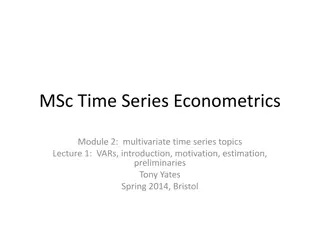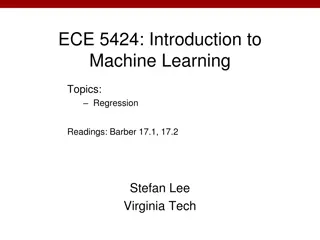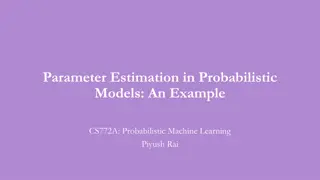Maximum Likelihood Estimation
Estimation methods play a crucial role in statistical modeling. Maximum Likelihood Estimation (MLE) is a powerful technique invented by Fisher in 1922 for estimating unknown model parameters. This session explores how MLE works, its applications in different scenarios like genetic analysis, and prac
1 views • 27 slides
Introduction to Statistical Estimation in Machine Learning
Explore the fundamental concepts of statistical estimation in machine learning, including Maximum Likelihood Estimation (MLE), Maximum A Posteriori (MAP), and Bayesian estimation. Learn about key topics such as probabilities, interpreting probabilities from different perspectives, marginal distribut
8 views • 23 slides
Maximum Likelihood Estimation in Physics
Maximum likelihood estimation (MLE) is a powerful statistical method used in nuclear, particle, and astro physics to derive estimators for parameters by maximizing the likelihood function. MLE is versatile and can be used in various problems, although it can be computationally intensive. MLE estimat
3 views • 22 slides
Maximum Likelihood Estimation in Statistics
In the field of statistics, Maximum Likelihood Estimation (MLE) is a crucial method for estimating the parameters of a statistical model. The process involves finding the values of parameters that maximize the likelihood function based on observed data. This summary covers the concept of MLE, how to
4 views • 19 slides
Maximum Likelihood Estimation in Machine Learning
In the realm of machine learning, Maximum Likelihood Estimation (MLE) plays a crucial role in estimating parameters by maximizing the likelihood of observed data. This process involves optimizing log-likelihood functions for better numerical stability and efficiency. MLE aims to find parameters that
6 views • 18 slides
Data Analysis Exercises - Day 2
Exercises demonstrating unfitted maximum likelihood modeling using RooFit toolkit for data analysis. Understand creating probability density functions, dataset generation, fitting models, and visualizing uncertainties. Learn analytical vs. numeric MLE estimation with examples like exponential distri
3 views • 15 slides
MSc Time Series Econometrics
This lecture covers Vector Autoregressions (VARs), including motivation, estimation methods (MLE, OLS, Bayesian), identification criteria, factor models, TVP VAR estimation, and useful sources in the field. It also discusses matrix/linear algebra prerequisites and applications in macroeconomics. The
6 views • 51 slides
Introduction to Machine Learning - Regression Readings and Topics
The content covers various topics on regression in machine learning, discussing readings by Barber, linear regression, Naive Bayes, logistic regression, MLE for Gaussian, Bayesian learning, and more. The slides provide insights into learning algorithms, parameter estimation, and implementations for
1 views • 28 slides
Primary Grades Language Assessment Program
This document outlines the Language Assessment for Primary Grades (LAPG), mandated by DepEd Memo No. 127 s. 2014. The LAPG, administered in June 15, 2016, targets Grade 3 pupils in public schools, covering English, Filipino, and Mother Tongue across 19 languages. The objectives include establishing
3 views • 8 slides
Bayesian Parameter Estimation for Gaussians in Probabilistic Machine Learning
Explore Bayesian parameter estimation for Gaussians in probabilistic machine learning, focusing on fully Bayesian inference instead of MLE/MAP methods. Understand how the posterior distribution evolves with increasing observations and the implications for parameter estimation.
2 views • 17 slides
Maximum Likelihood Estimation in Experiments
Explore the concept of Maximum Likelihood Estimation (MLE) in experimental scenarios, where rules are estimated based on observed events. Learn how MLE helps in determining the probability of outcomes and optimizing parameter estimation.
4 views • 20 slides
Parameter Estimation in Probabilistic Models: An Example in Probabilistic Machine Learning
Learn about parameter estimation in probabilistic models using Maximum Likelihood Estimation (MLE) and Maximum A Posteriori (MAP) estimation techniques. Understand how to estimate the bias of a coin by analyzing sequences of coin toss outcomes and incorporating prior distributions for more reliable
3 views • 7 slides
Maximum Likelihood Estimation for Random Effects Models in Econometric Analysis
Learn about the Maximum Likelihood Estimation (MLE) process for Random Effects Models in Econometric Analysis of Panel Data, as explained by William Greene from the University of South Florida. Topics covered include the Random Effects Model, Error Components Model, Notation for Generalized Regressi
1 views • 36 slides
IEEE 802.11-20/1534r1 Discussion on Multi-link Setup Details
Explore the details of IEEE 802.11-20/1534r1 focusing on multi-link setup discussions and fast link transitions. Understand the structure of Multi-Link Elements (MLE), scenarios considered, and related signaling for efficient setup. Discover how Radio ID plays a crucial role in managing links effect
2 views • 18 slides
CSI Grant and Finance Session Summary January 2025
Explore the agenda for the CSI Grant and Finance session in January 2025, including topics like amended budgets, MLE payments, scholarship reimbursements, and team introductions. Get updates on school finance, grants, and upcoming deadlines.
2 views • 14 slides
Introduction to Maximum Likelihood Estimate in Statistical Modeling
Discover the concept of Maximum Likelihood Estimate (MLE) in statistical modeling through examples and applications, exploring the ways to find optimal statistical models with the best parameters to describe data. Learn about probability functions, parametric models, and the basic steps involved in
4 views • 16 slides
Introduction to Maximum Likelihood Estimation in Pattern Recognition
Learn about the principles and methods of Maximum Likelihood Estimation (MLE) for parameter estimation in pattern recognition. Explore the concepts of bias, convergence, and Gaussian examples in MLE. Discover the difference between Maximum Likelihood and Bayesian estimation approaches, and understan
2 views • 17 slides
Understanding Maximum Likelihood Estimation (MLE)
Learn about Maximum Likelihood Estimation (MLE), a statistical method designed to find parameter values that maximize predictive accuracy. Explore the concept, examples like the Gaussian case, Fisher information, and the role of Ronald Aylmer Fisher in its development.
0 views • 58 slides
Bayesian Estimation and Modeling Issues in Econometrics
Learn about Bayesian estimation in econometrics, including the specification of conditional likelihood, priors, posterior density, and computation of Bayesian estimators. Explore modeling issues, convergence of Bayesian and Classical MLE methods, and practical problems in sampling from joint posteri
0 views • 35 slides
Applications of Maximum Likelihood Estimation in Econometrics
Explore the application of Maximum Likelihood Estimation (MLE) in econometrics through topics like Poisson regression models, doctor visit modeling, likelihood equations, and asymptotic variance. Understand MLE techniques for analyzing data and making statistical inferences in economic research and
1 views • 69 slides
Noise-Contrastive Estimation for Multivariate Point Processes
Explore the concepts of Noise-Contrastive Estimation (NCE) and Maximum Likelihood Estimation (MLE) for multivariate point processes. Learn about the differences, complexities, and applications of these estimation methods in data analysis.
1 views • 6 slides
Continuous Authentication Methods & Risk-based Algorithm
Discover how a hybrid continuous authentication system based on risk analysis and keystroke biometrics enhances security by incorporating risk-based authentication. Explore the MLE-RBA algorithm for improved risk assessment and the effectiveness of keystroke recognition in user authentication.
1 views • 14 slides
